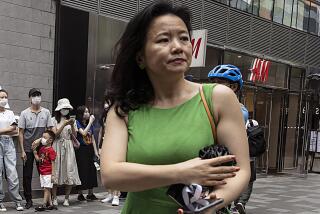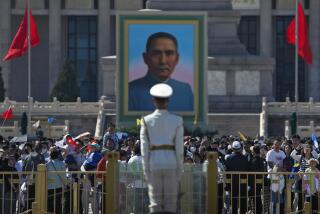China Frees CBS Producer Held 2 Days
- Share via
BEIJING — Chinese police on Friday released a freelance television producer who works for CBS here after detaining her for two days.
Both the network and U.S. Embassy officials had sought the release of Natalie Liu, 32, a Chinese citizen with U.S. permanent resident status. International media rights groups had also protested her detention, which occurred just days before a visit by U.N. human rights chief Mary Robinson scheduled to begin Sunday.
Earlier Friday, the Chinese government had defended the detention, saying that officials had not accredited Liu as a reporter.
“Liu Qingyan is not a Beijing-based reporter of U.S. CBS News and is not an American citizen,” a Foreign Ministry spokesman said, using Liu’s Chinese name.
“As a Chinese citizen, she engaged in activities that broke the law,” the spokesman said, without elaborating.
Liu was preparing to go to work Wednesday morning when 14 uniformed police officers entered and searched her home, confiscating video- and audiotapes, notebooks and business cards, according to her husband, Zhao Haiqing, a financial services manager in Bethesda, Md.
During the search, Zhao said, Liu managed to call him from a cellular phone in her bathroom. Police handcuffed her in front of her young son and daughter and led her away without any explanation, Zhao said.
“We are disturbed not only by the detention, but by the way in which it was carried out--without a search warrant or statement of charges,” the New York-based Committee to Protect Journalists wrote in a letter addressed to Chinese President Jiang Zemin.
Another letter to Jiang, from the Paris-based Reporters Without Borders, said that Liu’s “only crime seems to have been working for the network without official permission, which is not a crime that merits arrest, according to international standards.”
Liu had worked unhindered in Beijing for a year with the protection of neither a foreign passport nor Chinese government press credentials. Her detention was also unusual in light of the general relaxation of rules governing foreign news organizations in China.
Technically, foreigners without accreditation from China’s Foreign Ministry are banned from engaging in any journalistic work. They may hire Chinese employees only through government agencies, not directly. They may conduct interviews only with official approval. They are required to live in gated compounds guarded by armed sentries and watched by television cameras.
But the rules are as hard for Chinese officials to enforce as they are for journalists to abide by.
Chinese officials appear to be aware of the growing number of unaccredited young researchers and freelancers such as Liu employed by news bureaus, but they have so far taken no major action to crack down on them.
Police seldom interfere in journalists’ activities except when they touch on topics that are politically sensitive--such as dissidents and demonstrations--or when authorities estimate that they will seriously tarnish China’s public image.
Liu’s case also highlights the special position of the many Chinese Americans, Taiwanese and other ethnic Chinese foreign nationals, as well as Hong Kong Chinese, who work as journalists in China. They are less conspicuous than other outsiders in China’s homogeneous society and often have advantages over other journalists, such as family and other contacts.
Liu graduated from Beijing University with a degree in English and moved to the U.S. after participating in the pro-democracy demonstrations of 1989. She majored in journalism at New York University and began working for CBS as a freelance associate producer in 1997.
A CBS spokeswoman in New York, Kim Akhtar, told Associated Press that Liu had been kept under good conditions and treated well before her release. She said Liu would return to the United States within the next few days.
More to Read
Sign up for Essential California
The most important California stories and recommendations in your inbox every morning.
You may occasionally receive promotional content from the Los Angeles Times.













